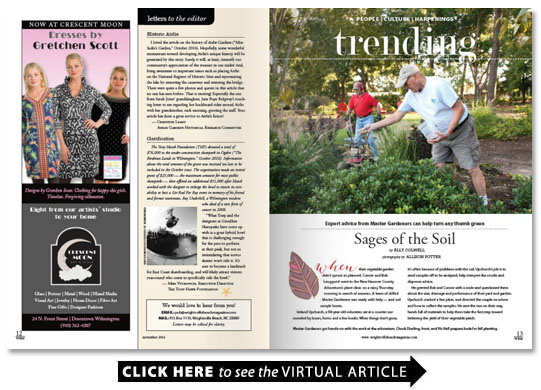Sages of the Soil
BY Elly Colwell
When their vegetable garden didn’t sprout as planned Connie and Bob Langgood went to the New Hanover County Arboretum’s plant clinic on a rainy Thursday morning in search of answers. A team of skilled Master Gardeners was ready with help — and soil sample boxes.
Ireland Upchurch a 94-year-old volunteer sat at a counter surrounded by boxes forms and a few books. When things don’t grow it’s often because of problems with the soil. Upchurch’s job is to send samples off to be analyzed help interpret the results and dispense advice.
He greeted Bob and Connie with a smile and questioned them about the size drainage and performance of their yard and garden. Upchurch cracked a few jokes and directed the couple on where and how to collect the samples. He sent the two on their way hands full of materials to help them take the first step toward bettering the yield of their vegetable patch.
WHAT
This kind of service is available five days a week at the plant clinic from Master Gardeners a group of highly trained volunteers who create the link between science-based research and the gardens of everyday people in New Hanover County. They give tips on the flowers plants vegetables and trees best suited to the climate and soil of coastal Carolina and trouble-shoot problems like weeds bugs and diseases.
“My job is to train Master Gardeners to share the science-based information that I get from the universities ” says Susan Brown New Hanover County Extension agent and consumer horticulturist. “They’re my support.”
Master Gardeners also help maintain the arboretum’s seven-acre plot of land.
The plants flowers and winding paths are not just a beautiful haven for the community. Brown calls the property “the horticulture laboratory.” The Master Gardeners experiment with growing techniques and participate in everything from building raised beds for the vegetable gardens to trimming the roses weeding the native plant area and constructing compost bins.
WHO
The title of Master Gardener is only bestowed after a rigorous training process that begins in January with a three-month class that meets twice a week and covers an extensive array of horticultural knowledge. There are usually about 30 people in each year’s class.
Passing the course is just the beginning. When they graduate — and become known as sprouts — they must complete 25 hours assisting in the plant clinic addressing people’s specific needs and an additional 25 hours in another extension program.
“The class covers a lot of material in a short period of time ” Brown says. “The clinic helps to reinforce it.”
The sprouts graduate from the program the following March and join the community of more than 300 certified Master Gardeners in New Hanover County.
WHERE
The gardeners must continue to volunteer each year to maintain their certification. They can choose to sit in on the plant clinic visit farmers markets teach classes in the community or help maintain the arboretum’s grounds.
All of this falls under a Master Gardener’s domain but education and advice remain the central mission. Much of it occurs during the plant clinic that runs Monday through Friday from 10 a.m. to 4 p.m.
People often come in when they notice a problem in their yard or they have a specific question.
“It usually ends up being at least two phases ” Upchurch says. “What is it and what can I do about it?”
HOW
When people bring an issue to the clinic the volunteers often point them first to the soil sample station to start identifying the problem.
“The soil sample tells you what to do to mend the soil ” says Master Gardener Nancy Leone.
The actual soil testing is done off-site at a lab. The volunteers interpret the results considering factors like irrigation acidity of the soil presence of fungi waste and compost to inform any diagnosis or further suggestion.
Behind the soil station is a desk where volunteers answer phone calls and can easily swivel to reach for a stack of information that is organized into binders. The arboretum has so much scientific information available that much of the Master Gardeners’ training relates to knowing how to narrow down and find the relevant research they need.
All advice that the volunteers provide comes first from research-based information and second from the diverse knowledge that the group of gardeners holds from their backgrounds.
Since the classes are held during working hours as are volunteer stints at the plant clinic the program tends to attract post-vocational men and women who passionately pursue gardening as an avocation.
When the sprouts begin their training some are already arborists or farmers while others are completely new to gardening. Marianne Schroeder notes that there isn’t a typical profile.
“The one thing everyone has in common is that they are so friendly ” she says.
The camaraderie of the volunteers makes for a light and productive environment.
“It’s a nice place to be and just garden and learn. It takes you away from life ” Leone says.

